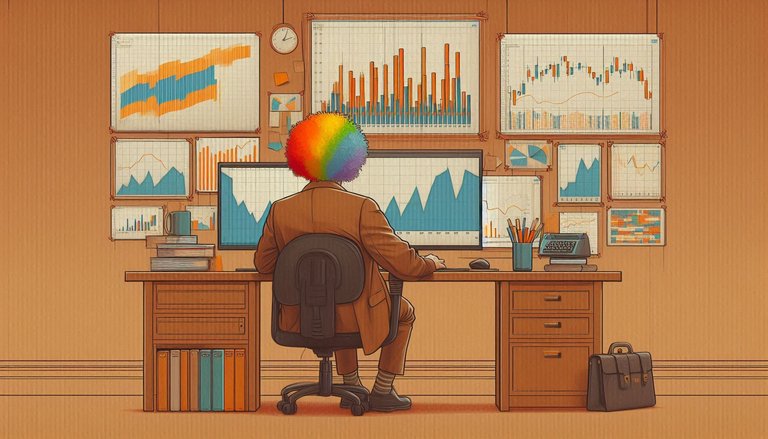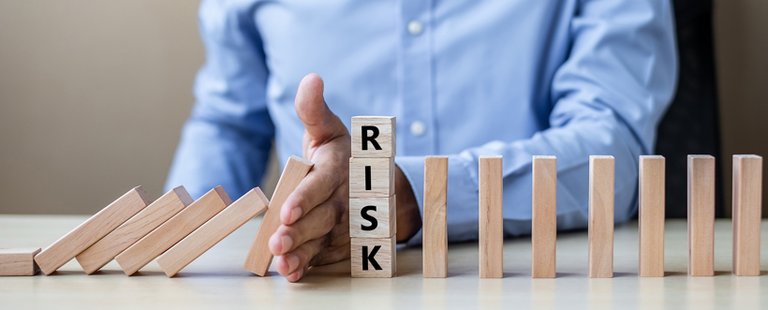
A few days ago on X, I found myself dragged into a debate that I believe is as old as trading itself. Someone was calling traders clowns because, according to their argument, they attempt to predict prices, which is impossible. And it's partially right.
It is quite common for people, experts, and casual critics to reduce trading to a simple guessing game or senseless betting. The problem is that this criticism arises from a complete lack of understanding of the fundamental principles of trading or, in many cases, from a mistaken idea learned from fake gurus and snake oil salesmen who claim to have the ultimate secret to success.
In reality, well-executed trading has little to do with prediction and everything to do with managing probabilities, controlling risk, and optimizing resources.
Trading as a Game of Probabilities

Successful traders do not aim to predict the future. They simply work with probabilities across different scenarios, where each trade represents a small piece within a larger objective.
Knowing with certainty whether the price of an asset will go up or down is impossible. Instead, the key to success lies in learning to identify patterns that, in certain contexts, have shown a tendency to produce favorable outcomes.
The outcome of an individual trade is entirely random, but the aggregate result of many trades is where the consequences of proper application of a trading system or strategy become apparent. It’s not about "guessing" correctly but about managing probabilities in a way that ensures the system’s profitability over the long term.
Most criticisms of trading stem from misunderstandings about its nature. Those who dismiss it often argue that "no one can predict the market." While this statement is true, it is irrelevant in the context of trading. Traders do not aim to win every trade, nor do they base their success on absolute accuracy in their analyses.
On the contrary, trading is about building a statistical edge and maintaining it over time.
Approaching trading from the perspective of prediction is, in fact, the easiest way to fail. The erroneous belief that trading is an attempt to predict often leads inexperienced individuals to chase the Holy Grail: an indicator or a "perfect" strategy.
This pursuit only perpetuates cycles of frustration and loss because it fails to address the essential aspects of trading: discipline, patience, and consistency.
Conclusion
Trading is not about guessing, nor does it attempt to predict the future. Real trading is based on analyzing probabilities, managing risk, and optimizing available resources. A successful trader does not aim to be right on every trade; they aim to build a system that is profitable in the long run.
This type of criticism ignores the true nature of this activity, and the proliferation of gurus promising precise forecasts only helps perpetuate misunderstandings that keep many people from gaining a realistic understanding of the market. In essence, trading is not about predicting but about adapting and seizing opportunities within a controlled environment of uncertainty.
Español

Hace unos días en X me ví arrastrado a un debate que es tan antiguo como el trading mismo creo. Una persona tiladaba de payasos a los traders porque intentan predecir el precio y eso es imposible de hacer según si discurso. Y tiene razón, en parte.
Es bastante común que personas, expertos y críticos ocasionales reduzcan al trading a un simple juego de adivinanzas o apuestas sin sentido. El problema es que esta crítica surge de un total desconocimiento de los fundamentos principales del trading o en muchas ocasiones una idea errónea aprendida de falsos gurús y vende humos que afirman tener el secreto definitivo par el éxito.
En realidad, el trading bien ejecutado tiene poco o nada que ver con la predicción y todo que ver con la gestión de probabilidades, el control del riesgo y la optimización de recursos.
El trading como un juego de probabilidades

Los traders exitosos no buscan predecir el futuro. Simplemente trabajan con las probabilidades en diferentes escenarios, donde cada operación representa una pequeña pieza dentro de un objetivo más amplio.
Saber con certeza si el precio de un activo sube o baja es imposible, en cambio aprender a identificar patrones que en determinado contexto han mostrado tendencia a ofrecer resultados favorables es la clave para el éxito en este trabajo.
El resultado de un trade en solitario es totalmente aleatorio, pero la suma de muchos como un conjunto es donde se pueden ver las consecuencias de la correcta aplicación de un sistema o estrategia de trading. No se trata de "adivinar" correctamente, sino de gestionar las posibilidades de una manera que, a largo plazo, el sistema sea rentable.
La mayoría de críticas hacia el trading surgen de malentendidos acerca de su naturaleza. Quienes descalifican la actividad suelen argumentar que "nadie puede predecir el mercado". Y, aunque esta afirmación es cierta, es irrelevante en el contexto del trading. Los traders no intentan ganar cada operación ni basan su éxito en la precisión absoluta de sus análisis.
Por el contrario, el trading consiste en construir una ventaja estadística y mantenerla a lo largo del tiempo.
De hecho abordar el trading desde esta perspectiva es la forma más fácil de asegurar el fracaso y es que la creencia errónea de que el trading es un intento de predicción a menudo lleva a las personas con menos experiencia a perseguir el Santo Grial: un indicador, una estrategia "perfecta".
Esta búsqueda solo perpetúa ciclos de frustración y pérdida, porque no aborda los aspectos esenciales del trading: la disciplina, la paciencia y la consistencia.
Conclusión
El trading no va de adivinar, tampoco intenta predecir el futuro. El trading real basa sus fundamentos en el análisis de probabilidades, la gestión del riesgo y la optimización de los recursos disponibles. Un trader de exito no pretende tener razón en cada operación, busca construir un sistema que sea rentable a largo plazo.
Este tipo de críticas ignoran la verdadera naturaleza de esta actividad y a la proliferación de gurús que prometen previsiones precisas solo ayuda a perpetuar un malentendido que aleja a muchas personas de una comprensión realista del mercado. En esencia, el trading no se trata de predecir, sino de adaptarse y aprovechar oportunidades dentro de un ambiente de incertidumbre controlada.
Traducido al Inglés usando ChatGPT.
Todas las imágenes fueron creadas usando Microsoft Designer.
Posted Using InLeo Alpha
Congratulations @uncubanomas! You have completed the following achievement on the Hive blockchain And have been rewarded with New badge(s)
<table><tr><td><img src="https://images.hive.blog/60x70/https://hivebuzz.me/@uncubanomas/upvotes.png?202411252242" /><td>You distributed more than 1000 upvotes.<br />Your next target is to reach 1250 upvotes. <p dir="auto"><sub><em>You can view your badges on <a href="https://hivebuzz.me/@uncubanomas" target="_blank" rel="noreferrer noopener" title="This link will take you away from hive.blog" class="external_link">your board and compare yourself to others in the <a href="https://hivebuzz.me/ranking" target="_blank" rel="noreferrer noopener" title="This link will take you away from hive.blog" class="external_link">Ranking<br /> <sub><em>If you no longer want to receive notifications, reply to this comment with the word <code>STOP